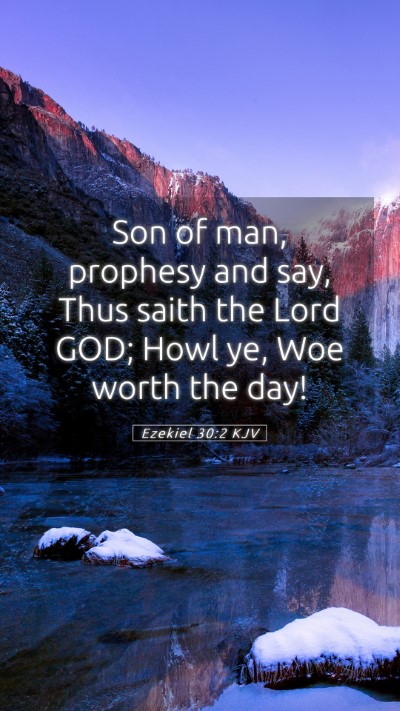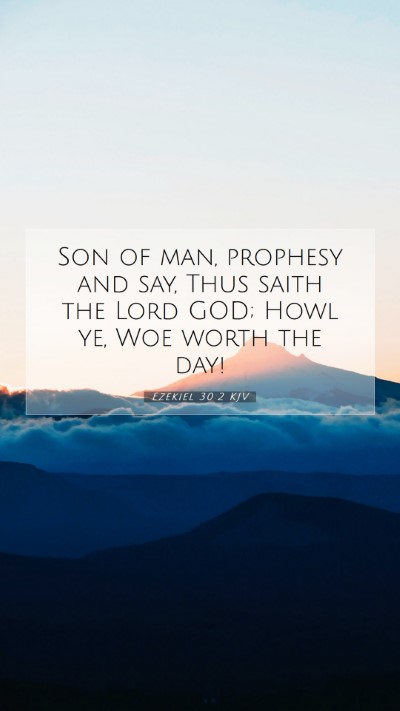Ezekiel 30:2 - Understanding the Meaning of this Bible Verse
Verse Reference: Ezekiel 30:2 - "Son of man, prophesy and say, Thus saith the Lord God; Howl ye, Woe worth the day!"
Contextual Background
The book of Ezekiel is a prophetic work attributed to the prophet Ezekiel during the time of the Babylonian exile. Ezekiel's prophecies address the coming judgment on Israel and the surrounding nations, offering insights into God's plans and assurances of eventual restoration. In this context, Ezekiel 30 is a warning about the impending judgment on Egypt, a significant power of the time that had a complex relationship with Israel.
Verse Analysis
According to Matthew Henry, this verse serves as a proclamation of woe, highlighting the seriousness of the coming judgment. The term "howl" indicates an intense mourning, signaling not only personal grief but a collective lamentation over the doom approaching Egypt.
Albert Barnes interprets this verse as a call to acknowledge the gravity of the situation. By addressing Egypt directly, God uses Ezekiel to express the certainty of impending judgment and the distress it will cause. It's indicative of God's authority and sovereignty over all nations, including powerful empires like Egypt.
Adam Clarke expands on this by suggesting that the use of "woe" signifies a prophetic warning. The statement is not merely an expression of sorrow but a foreshadowing of disaster and collapse, meant to evoke a sense of urgency and repentance in the listeners.
Key Themes
- Divine Judgment: The verse underscores the theme of judgment prevalent throughout the prophets. It serves as a reminder that no nation is above God's scrutiny.
- Prophetic Authority: Ezekiel’s role as a prophet is reinforced; he speaks not out of personal emotion but as a vessel for God’s word.
- Urgency of Repentance: The calling to "howl" is an invitation for Israel—and by extension, all nations—to recognize their sinful state and return to God.
Application for Today
For modern readers, Ezekiel 30:2 is a stark reminder of the consequences of turning away from God. It emphasizes the importance of repentance and being attuned to spiritual realities, even amid societal turmoil. It serves well in Bible study groups and online Bible study sessions where believers can explore how ancient texts apply to contemporary life.
Related Scripture References
- Jeremiah 46:1-12 - Similar warnings against Egypt, reinforcing the message of impending judgment.
- Ezekiel 32:1-16 - Further prophecies regarding Egypt's downfall, illustrating God’s judgment on nations.
- Isaiah 19 - A prophecy concerning Egypt that highlights its future desolation.
Conclusion
In summary, Ezekiel 30:2 offers profound insights into the nature of God's judgment, the authority of prophetic voices, and the need for repentance. Through careful Bible verse commentary, scripture analysis, and biblical exegesis, believers can enrich their understanding of the timeless truths contained within Scripture.
This verse encourages readers to engage with Bible study tools and Bible study resources to deepen their appreciation for the messages of the prophets and their applications in today's context.


